U.S. President Barack Obama announces that he has accepted the resignation of Gen. Stanley McChrystal and that he will nominate Gen. David Patraeus to take over command of the troops in Afghanistan. McChrystal’s resignation comes after a controversial profile of the general in was published in Rolling Stone Magazine.
North America Archive
Free Newsletter

MEXICO CITY — Ten years ago, Mexico’s National Action Party (PAN) swept to power on an agenda of change, ousting the Institutional Revolutionary Party (PRI) after 71 years of uninterrupted rule. The PAN agenda included more jobs, 7 percent economic growth and honest government — a departure from the PRI, which had presided over a political system oiled by corruption and patronage. A decade later, removing the PRI from power on the federal level remains the party’s greatest accomplishment. Much of the center-right party’s agenda has gone unfulfilled, and the PAN has largely failed to establish itself as a party […]
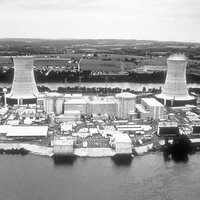
Will the Deepwater Horizon disaster, already 2010’s best candidate for the most significant “black swan” event, have a similar, long-lasting geopolitical impact as the Three Mile Island accident 30 years ago? If that mishap had not occurred, it’s very likely that the United States would have a vastly different, and superior, position vis-à-vis energy independence today. The U.S. could have moved down a similar path to that of France, which generates most of its electricity — some 78 percent — from nuclear power plants. Some of the side benefits the French enjoy as a result include much cleaner skies, since […]
The European Commission finalized a draft of a banking data-sharing agreement with the U.S. today. The draft will now be presented to the European Parliament and the heads of state meeting for final approval before taking effect. A similar deal was torpedoed by the EU parliament in February due to concerns over privacy infringements. In a nod to parliamentarians’ concerns, the new agreement includes conditions to limit shared data to information related to ongoing terrorist investigations and to forbid data mining. This is the first significant example of the EU parliament’s expanded powers under the Lisbon Treaty. I remain convinced […]

American culture has long had a fascination with outer space. President John F. Kennedy described it as “this new ocean,” and words like “destiny” and “frontier” are frequently used to characterize America’s relationship to it. Hollywood and the media often approach it with a sense of wonder, humility, and even a bit of fear. From the opening strains of “2001: A Space Odyssey” to the aliens from “Avatar,” space remains a source of mystery. This cultural phenomenon may be a remnant of the first two-thirds of the 20th century, when in the span of a single lifetime, it was possible […]
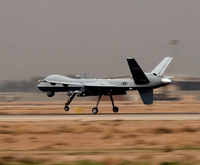
The past year has been a pivotal period for one of the world’s most important strategic industries. In 2009 and early 2010, the military aerospace industry marked key turning points: For the first time, the U.S. Air Force — the world’s most important aerospace customer — bought more unmanned aircraft than manned aircraft. In the same time-span, the Air Force refused to extend production of its exclusive, world-beating F-22 fighter beyond the 187 units it has already ordered, instead opting to develop the smaller, potentially cheaper-per-unit and exportable F-35 Joint Strike Fighter. Following that decision, revelations surfaced in early 2010 […]

After half a century, the revolution in computer technology continues to rapidly transform the world about us. For reasons that are fundamentally economic, the atomic building blocks on which that revolution is based are semiconductor electronic components — chips. It has been estimated that technological improvements in semiconductors accounted for 40 percent to 60 percent of the price-performance improvement in computers in the late 1990s. Those rapid declines in computer prices in turn led to much wider usage of computers and significant improvement in U.S. productivity growth during the same period. The first electronic digital computers used during World War […]
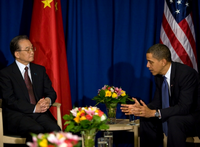
A lot of national security experts would like a lot more fire — and firepower — from our president. Op-ed columnists across America worry that our friends no longer trust us and that our enemies no longer fear us. President Barack Obama’s quest for more-equitable burden-sharing among great powers seems to be getting us nowhere, so why bother with more-equitable benefit-sharing? But before attacking the Obama administration’s coolly rational — dare I say “lawyerly” — take on great-power politics, let’s first remember what got us to this point. Bush-Cheney’s “It’s better to be feared than respected” tear nearly tore up […]
NewsHour’s Ray Suarez interviews Ambassador Susan Rice about the United Nations Security Council’s newly passed sanctions on Iran. Rice says that this round of sanctions specifically targets industries that could facilitate the development of Iran’s nuclear program. The ambassador also said she hopes these sanctions are just the beginning and leaves it up to member nations to reinforce and bolster the UNSC’s crackdown on Tehran. Having trouble viewing this video? Click here to watch.
U.S. President Barack Obama and Peruvian President Alan Garcia speak to the media after meeting in the Oval Office. The two discussed nuclear non-proliferation, climate change, and the state of democracy in Latin America. Garcia says that Latin America needs to focus on a modern democracy that embraces technology and investment.

After Mexican President Felipe Calderon won a highly controversial election by a razor-thin margin in 2006, he kicked off his presidency by declaring war on his country’s increasingly powerful and brutal drug cartels, deploying tens of thousands of troops across the country. Since Calderon’s much-publicized crackdown began however, the death toll from drug violence in Mexico has exploded, claiming roughly 23,000 lives — including cartel members, innocent civilians, police officers and soldiers — with 4,000 of those deaths coming in the first five months of this year alone. Over the past four years, Ciudad Juárez, a sprawling city of 1.3 […]
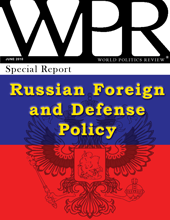
This World Politics Review special report is a compilation of WorldPolitics Review’s top articles on Russian foreign and defense policyfrom November 2009 through May 2010. Below are links to each article, which subscribers can read in full. Subscribers can also download a pdf version of the report. Not a subscriber? Subscribe now, or try our subscription service for free.Russia-Saudi Relations: The Kingdom and the BearBy Saurav JhaNovember 9, 2009 Ingushetia: Russia’s North Caucasus Policy at a Tipping PointBy Valery Dzutsev November 17, 2009 Global Insights: Mistral Talks Reveal Russian Shipbuilding MaladiesBy Richard Weitz December 1, 2009 Global Insights: Russian-Indian Strategic […]
France 24 just posted last Friday’s panel discussion program, The World This Week, which I had the pleasure of participating in. The other panelists were Matthew Saltmarsh of the IHT, Paul Taylor of Reuters and Pierre Haski of Rue89.com. We discussed tensions on the Korean Peninsula, Europe’s ongoing economic woes, Jamaica’s unrest, and the Gulf oil spill. Part one is here. Part two is here. One thing I’dd to why the Gulf spill is not comparable to Katrina. In addition to resonating with the President George W. Bush’s troubled relationship with facts and credibility, Katrina also underlined the lack of […]
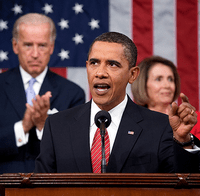
Last week, President Barack Obama released his first National Security Strategy. Analysts and observers have focused much of their attention so far on how the new NSS breaks from the one formulated by the Bush administration. By this argument, Obama’s NSS represents a new direction both by “counting more on U.S. allies” than former President George W. Bush did, and by repudiating Bush’s unilateralism. In reality, the document does neither of these things. To be precise, it uses words like “diplomacy” and “allies” at statistically the same rate as Bush’s 2006 National Security Strategy and still claims that America “reserve[s] […]
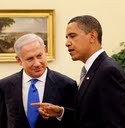
The international crisis resulting from Israel’s interdiction yesterday of a humanitarian aid flotilla heading toward the blockaded Gaza Strip could have several consequences, few of them good for the United States, the Middle Eastern peace process, and many other parties. First, the crisis could disrupt the indirect peace talks between Israelis and Palestinians that only just resumed a few weeks ago, after roughly 17 months of false starts and frustrated expectations. Many observers have noted that the Gaza flotilla confronted the Israeli government with a no-win situation. The same could be said for the choices now facing the Obama White […]
